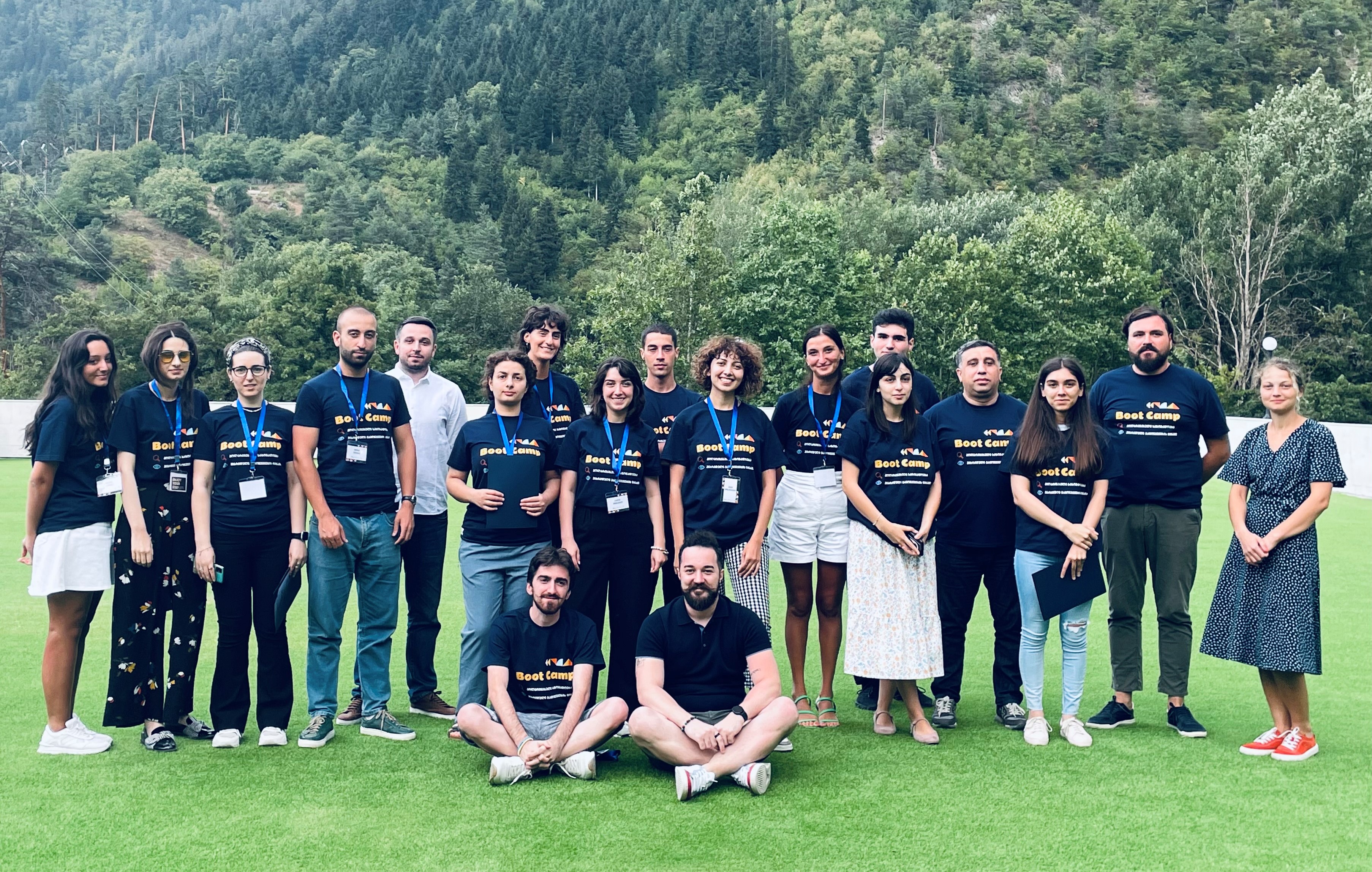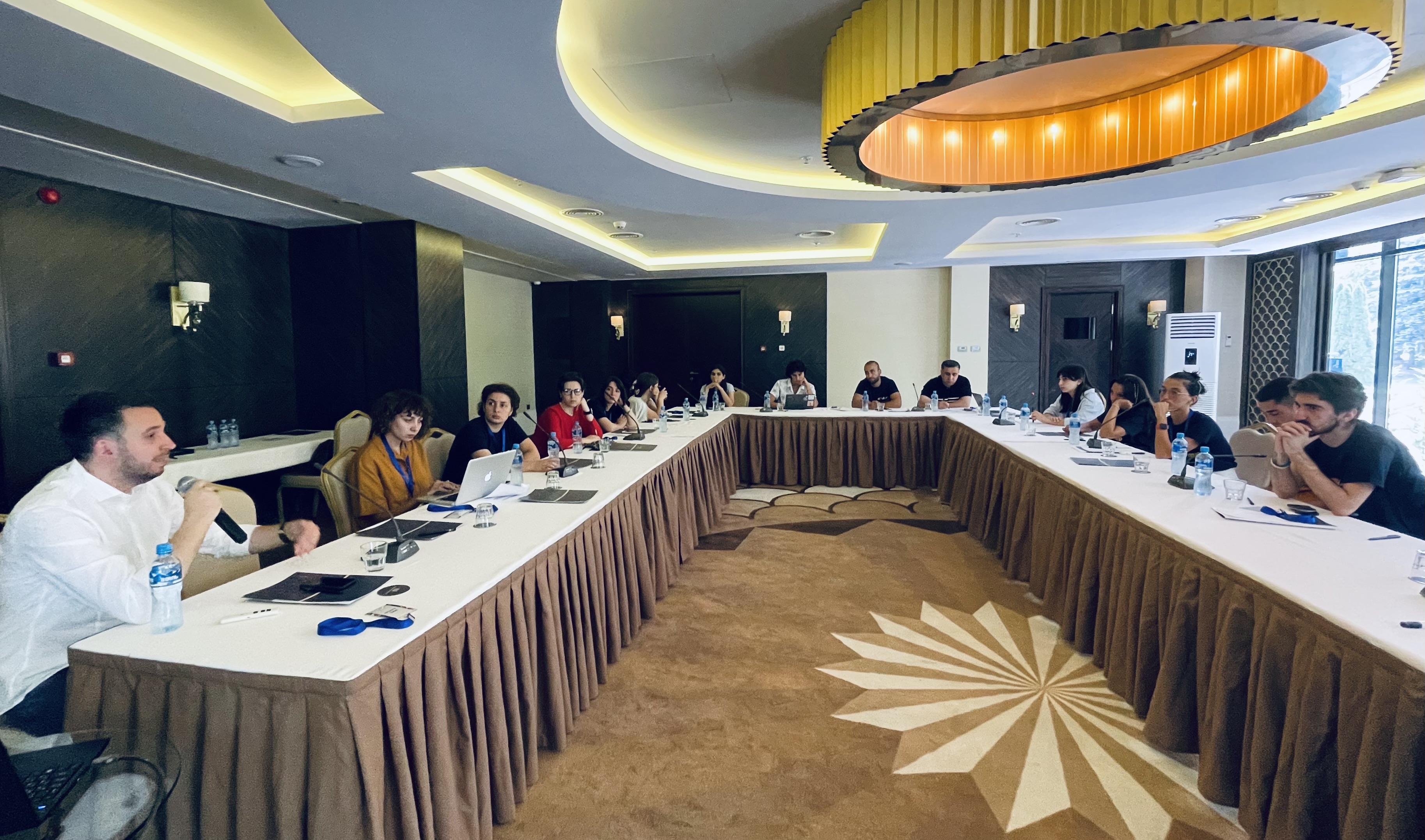


 On August 18-20, 2022, Boot Camp: "Polarized Society Facing Hybrid Challenges", organized by the Institute for Development of Freedom of Information (IDFI) and the University of Georgia (UG), was held in which the students of the IDFI/UG Academic and Certificate Course - Disinformation and Propaganda Research: History, Theories and Means of Debunking were involved.
On August 18-20, 2022, Boot Camp: "Polarized Society Facing Hybrid Challenges", organized by the Institute for Development of Freedom of Information (IDFI) and the University of Georgia (UG), was held in which the students of the IDFI/UG Academic and Certificate Course - Disinformation and Propaganda Research: History, Theories and Means of Debunking were involved.
Within the framework of the two-day camp, the participants discussed the modern challenges of hybrid warfare, the current trends related to the manipulation of information, and the spread of propaganda. Special attention was paid to the policies following Russia's aggressive invasion of Ukraine and the leverages of society based on Ukraine's experience in the fight against hybrid warfare.
On the first day of the event, the head of IDFI's memory and disinformation direction, Anton Vatcharadze, and IDFI's associate researcher, Nino Gozalishvili, addressed the participants with a welcome speech. They talked about the goals of the aforementioned event and future plans. They also drew attention to existing hybrid challenges and, in this regard, the need for raising public awareness.
One of the speakers of the event, Andro Gotsiridze, the founder of the Cyber Security Educational Research Center, spoke about hybrid threats and cyber security, especially in relation to the case of Ukraine. He discussed the chronology of cyber security, the types of cyber-attack, and the role of cyber operations, in terms of kinetic and psychological effects of recent events in Ukraine.
On the second day of the Boot Camp, the head of the Investigative Media Lab of the University of Georgia (UG), Sopho Gelava, spoke about the war of narratives, how the information war was being waged by Russia alongside the Russia-Ukraine war. In relation to this, she discussed the number of open sources and introduced the main features of the information war to the participants of the event based on specific examples. She also drew attention to the objectives of the hybrid war and the war of narratives existing in Georgia. At the end, through group work, in the context of Georgia, Russian propaganda and the means of combating it were identified, and in this regard, the issue was expanded and discussed in a wide range.
 Cyber security expert Giorgi Iashvili, within the mentioned event, spoke about cyber-attack as an element of hybrid war. Boot Camp participants were once again introduced to the peculiarities of hybrid warfare and methods used by various actors involved in it, discussed the nature and role of cyber warfare in relation to hybrid warfare, and the differences between information and cyber warfare. He also spoke about the example of Ukraine, in terms of kinetic and cyber activities. At the meeting, special attention was paid to the legal issues pertaining to the principle of NATO’s collective defense and the interaction of cyberspace with it. At the end of the report, as a conclusion, he discussed how the country is responding to the challenges of cyber-attack.
Cyber security expert Giorgi Iashvili, within the mentioned event, spoke about cyber-attack as an element of hybrid war. Boot Camp participants were once again introduced to the peculiarities of hybrid warfare and methods used by various actors involved in it, discussed the nature and role of cyber warfare in relation to hybrid warfare, and the differences between information and cyber warfare. He also spoke about the example of Ukraine, in terms of kinetic and cyber activities. At the meeting, special attention was paid to the legal issues pertaining to the principle of NATO’s collective defense and the interaction of cyberspace with it. At the end of the report, as a conclusion, he discussed how the country is responding to the challenges of cyber-attack.
In the final part of the event, Revaz Topuria, guest lecturer of the University of Georgia (UG) and founder of the Franklin Club, held a simulation for the Boot Camp participants. Within the framework of the simulation, the participants developed an analytical document on the role of different groups of society in hybrid warfare. Cases of Georgian society were mainly used for practical work. The moderators of the simulation were the head of IDFI's memory and disinformation direction, Anton Vatcharadze, and IDFI's associate researcher, Nino Gozalishvili.
At the end of the Boot Camp, Nino Gozalishvili once again spoke about the need to fight disinformation and, in this regard, the involvement of the public. She expressed hope that the participants of the event will continue to be involved in the activities of IDFI in various directions in the future.
At the end of the event, an award ceremony was held based on the final evaluations of the participants of the Certificate Program: Disinformation and Propaganda Studies and their activity in the camp.
Boot Camp was held with the financial support of the Swedish International Development Cooperation Agency, Sida.